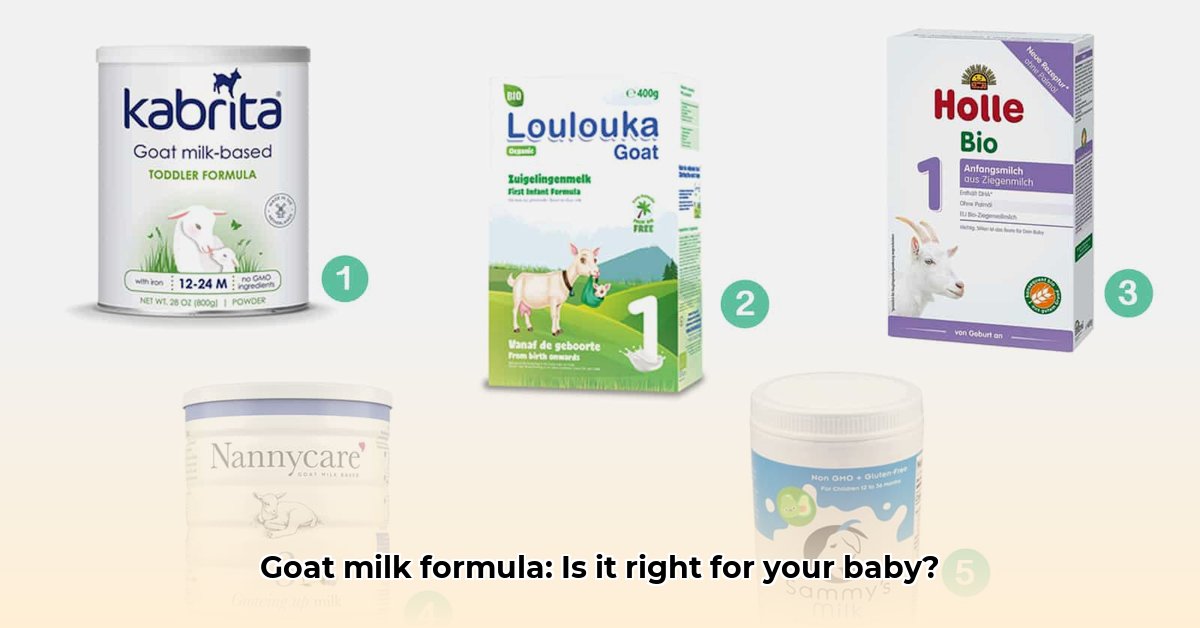
Choosing the right formula for your baby can be overwhelming. Goat milk formula is gaining popularity as a potential alternative to cow's milk-based formulas, offering unique benefits for some infants. This comprehensive guide will delve into the potential advantages and disadvantages, empowering you to make an informed decision for your little one.
Benefits of Goat Milk Formula: A Closer Look
Goat milk formula presents several potential benefits, but it’s crucial to understand that individual results may vary. Let's explore these potential advantages:
Easier Digestion: A Gentler Approach?
Many parents report that their babies experience improved digestion with goat milk formula. This is potentially due to the difference in protein structure compared to cow's milk. Goat milk proteins may be easier for some infants to break down, potentially leading to less fussiness, gas, and colic. “[While] research suggests goat milk protein might be easier for some babies to break down than cow's milk protein... results vary widely," cautions Dr. Emily Carter, Pediatrician at Children's Hospital, emphasizing the need for individual assessment. However, it's not a guaranteed solution for every baby.
Is your baby particularly fussy after feedings? Could easier digestion provide some relief?
Gut Health: Nurturing a Thriving Microbiome
Goat milk naturally contains prebiotics (substances that feed beneficial gut bacteria). This could contribute to a healthier gut microbiome, which plays a vital role in overall health and immunity. A strong gut microbiome can improve nutrient absorption and bolster the immune system. "A healthy gut is essential for overall health," states Dr. Sarah Lee, Registered Dietitian at the University Health System. This benefit is another potential upside, but individual responses will differ.
What role does a balanced gut microbiome play in your baby's overall well-being?
Allergy Considerations: A Potential Alternative?
For babies with sensitivities to cow's milk, goat milk formula may be considered as an alternative. However, it's crucial to remember that goat milk is not hypoallergenic. While some babies with cow's milk allergies tolerate goat milk better, it can still trigger allergic reactions in others. Always consult your pediatrician before switching formulas, especially for babies with existing allergies.
Does your child have sensitivities? Is goat milk a safe alternative, or are there other options better suited to allergy management?
Making the Switch: A Step-by-Step Guide
Introducing goat milk formula requires a careful approach to minimize potential disruption. Follow these steps:
Pediatrician Consultation: Discuss the switch with your pediatrician to ensure goat milk formula is appropriate for your baby's individual needs and health status. This is the most critical step.
Gradual Introduction: Avoid an abrupt change. Start by mixing small amounts of goat milk formula with your baby's current formula. Gradually increase the proportion of goat milk formula over several days to monitor the reaction and allow for smooth adaptation.
Close Monitoring: Closely observe your baby for any changes in bowel movements, skin condition (rashes, etc.), vomiting, or behavior changes. Document any reactions, however slight.
Ongoing Communication: Maintain regular communication with your pediatrician, especially during the transition period. They can help you assess your baby's response and address any concerns.
Choosing the Right Formula: Key Considerations
When selecting a goat milk formula, consider these factors:
- FDA Approval: Ensure the formula is FDA-approved to guarantee it meets essential nutritional standards.
- Nutritional Content: Examine the label thoroughly to confirm it contains adequate levels of iron, calcium, vitamins, and other essential nutrients. This is particularly important to ensure the formula properly supplements your baby's dietary needs.
- Organic Options: Consider organic options to reduce exposure to pesticides and herbicides. This is a matter of personal preference.
- Cost and Availability: Goat milk formula may be more expensive and less readily available than cow's milk-based formulas.
Weighing the Pros and Cons: An Informed Decision
| Feature | Pros | Cons |
|---|---|---|
| Digestion | Potentially easier digestion for some babies; may reduce fussiness. | May still cause digestive issues in some infants; results can vary. |
| Allergies | May be tolerated better by some babies with cow's milk sensitivities. | Not hypoallergenic; can still trigger allergic reactions in some babies; consult your pediatrician. |
| Nutritional Value | May offer a distinct nutritional composition; particularly MCT levels. | Might lack certain nutrients compared to some cow's milk-based formulas. |
| Cost | Can be more expensive than some standard formulas. | Availability may be less compared to standard cow's milk-based formulas. |
Remember, this information is for educational purposes and does not substitute professional medical advice. Always consult your pediatrician before making any changes to your baby's diet. Your pediatrician remains your most valuable resource for an informed approach to your baby's nutritional needs.